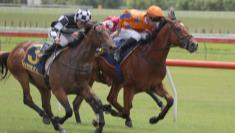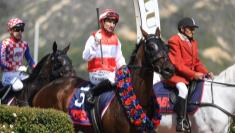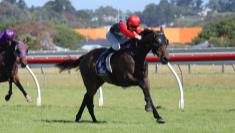
Maximising return from assets vital to healthy racing future
Further rationalisation to maximise the full potential of remaining assets is paramount to the future success of the New Zealand racing industry.
That’s the view of New Zealand Thoroughbred Racing chief executive Bruce Sharrock, brother of Group One-winning New Plymouth trainer Allan, who was promoted to the top role after serving as Chief Operating Officer.
While he has only had his feet under the desk for a little over a week, Sharrock is convinced a united approach is the way forward.
“At a very high level, if you look around the country and look at the asset base that the industry has, it would be safe to say, including Ellerslie, there would be a billion dollars’ worth of asset,” he said.
“You could argue that it is not returning what it should to the industry. If we can work together and rationalise the assets and start generating a reasonable term, and let’s assume five per cent which I think is conservative, that’s another $50 million running into our business annually.
“That all of a sudden, transforms the industry for generations beyond ours.”
Further tracks closures will also be part and parcel of the way forward.
“I think there is further rationalisation of venues to come, without a doubt. There will be a feeling out there that we will need more tracks and we have come under pressure because we’ve got Te Aroha and Ellerslie both undergoing renovation,” Sharrock said.
“It has put a lot of stress on the north, but once we have worked through that I think ultimately clubs will still have their day, albeit at another location.
“Again, some are finding that it is costing a lot of money just to keep them ticking over.
“Where you’ve got an asset worth multi-million dollars, and I’m throwing this out there anecdotally, raising sheep, we need to be smart with it and turn it into ongoing revenue for the industry.”
Sharrock is mindful of the pace of change and believed there was cause for optimism on that front.
“I’m sensing some real momentum around changes. People are accepting that if we do want to be regarded as a highly regarded sports industry in a decade’s time, we need to make some serious moves in the next short while,” he said.
“Probably the most positive is the amount of discussion going on at club level, around clubs working together for better outcomes.
“Clearly, this was led by ATR with Ellerslie and Counties coming together and there are some very good conversations going on around the country.
“That would see potentially the consolidation of our assets. I think the biggest positive for the industry is to look to utilise our latent assets and generate ongoing inter-generational revenue from them, it will set the industry out for its future.
“There are a number of green shoots within the industry, purely from a wagering point of view things are going really well.
“That’s the engine of the industry, but clearly we have issues around our infrastructure, in terms of tracks and we’re currently embarking on a plan to improve those within the next two or three years.”
Sharrock acknowledged that not all change would be embraced by all, but moving with the times is imperative.
“Clearly we have got the SNS that is going to run out toward the end of this year, that’s the Single National System so it is the re-creation of our operating system,” he said.
“That will be confronting for some because it means a change to the way they have done their business. But again, it is one of these evolutions and we have to start moving with the times.
“Ask anyone, how did you use to bank 20 years ago? How did you get insurance? How did you get your television and everything has changed and we need to move forward.”
Recruiting for the future was another area of focus and the Racing Business Associates scheme has made a promising start.
“Fundamentally, what we are looking to do is to bring in good people who are willing to learn our business and ultimately play a role with NZTR or in a broader sphere,” Sharrock said.
“The quality of our administrators has been overlooked for some time and the response we have had has been outstanding.
“I am excited to get some of those people and those who have a desire to learn from an administration point of view.”
Sharrock said training and recruitment, with an accent on youth, is also underway in another area.
“We need to continue to train and develop our apprentice base as well and that needs an overhaul and is in the process of happening,” he said.
“There are a couple of exciting things that will come to light in the next month or month and a-half. We will be looking to encourage more quality young people, horsemen and women into the industry.”
Sharrock also paid tribute to NZTR’s ability to negotiate its way through the pandemic.
“I have to say that one thing I am immensely proud of the team, and prior to my involvement, and also all the stakeholders who got through two years of COVID-interrupted business,” he said.
“While restrictions have caused huge amounts of frustration, particularly for those in the north who were locked down for four months, the fact is we continued to trade and operate all the way through.
“I am au fait with a lot of other sports and those I am aware of in this country, cricket, rugby, netball, rugby league, have all had interrupted schedules.”
Sharrock speaks from lengthy experience through his involvement with other sports.
“The business that I have had, and am still a shareholder in, was a global sports management business,” he said.
“It acts for professional players at rugby and rugby league and also acts for coaches and everybody else in those industries, as well as a consultancy business to clubs and is quite broad now.”
Sharrock’s family has a long-time involvement with racing, his aforementioned brother Allan is a successful trainer, as was his late father Bob.
“I have always loved this industry and the way I have viewed it is that it is a sport and I just think that we have to be at that table and have conversations with other sports,” he said.
“It is one of my ambitions that we have got to be taken seriously. When a rugby player talks about their future, I want the jockeys to be in the same conversation or a trainer, who are like the high-end coaches and conditioners in sport.
“They are doing the same thing, but that detail is lost on the great population and we have to do better.”









